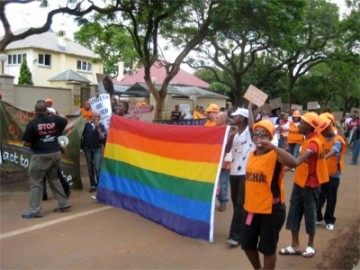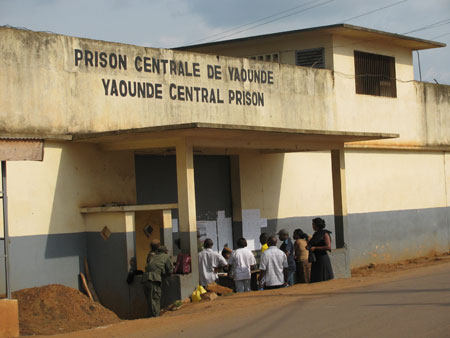Feature Image via ilga.org
On Wednesday, over 100 people gathered for a rally organized by the Association of Cameroonian Youth to post homophobic signs on suspected gay-friendly bars and to distribute anti-gay pamphlets in Cameroon’s capital city, Yaounde. Just one month after Cameroonian LGBT activist Eric Ohena Lembembe was found dead, the violence against the LGBT population continues to rise.
The participants of the rally marched through Yaounde carrying the Cameroon flag and wearing shirts with anti-gay slogans. They declared it the “Day Against Homosexuality” and claimed it was to honor the death of a student who was “assaulted by homosexuals” and found in a hotel in 2006. The Association of Cameroonian Youth wants to see stricter enforcement of anti-gay laws despite the fact Cameroon already prosecutes the most LGBT citizens in sub-Saharan African. Most of them are arrested, charged and sentenced for up to five years with little evidence of same-sex involvement.

Michal Togue, a lawyer who works in LGBT rights, believes that the government was in support of this rally and noted that many gay activists have been actively receiving threats of violence:
“I have the impression that the persecution of homosexuals is sharply on the rise since Lembembe was murdered. A demonstration like the one today is clear proof. If I tell you I’m not scared, then I’m joking. I’m scared for my security.”
Although Article 347 of Cameroon’s penal code already violates the country’s constitution as well as human rights standards, the organizer of the Association of Cameroonian Youth, Sismondi Barley Bidjocka, says they are pushing to increase the maximum sentence to twenty years in prison. Bidjocka was quoted: “It is a struggle to push the authorities to clearly assert our rejection of homosexuality as a nation, and to increase the punishment.” While the ACY believes current punishment isn’t harsh enough, the daily harassment and violence that Cameroonian LGBT population faces is rampant.

Togue also said that two transgender women were attacked last week in Yaounde, adding to the countless reports of targeted aggression in the city. While police did break up this attack, Togue pointed out that the rally should have also been dismantled, considering that large-scale gatherings are required to have government approval.
The Human Rights Watch outlined numerous cases involved the anti-gay law in a 55-page report, “Guilty by Association,” released in March of this year. Though Cameroon president Paul Biya claimed earlier this year that “minds were changing” about homosexuality in the country, the government has taken no formal action to prevent violence or change the prosecution of LGBT people. Groups like Yaounde-based CAMFAIDS, (which Lembembe was involved with), and Alternatives-Cameroun continue to work to decriminalize homosexuality and pursue equality. Director of Alternatives-Cameroun, Yves Yomb, has put out a challenge to the government to stand up for all citizens: “We are calling on our government to stop waiting around helplessly for minds to change, and instead to show a bit of courage… and [to] inform the public that this is a matter of upholding fundamental rights.”
LGBT rights continues to be a controversial issue throughout Africa; homosexuality is illegal in 38 countries, and in a few, punishable by death. The gay rights and AIDS awareness organizations have staged protests, reached out for international support and as recently as July, AIDs workers have gone on strike. After Lembembe’s murder, his lawyer, Alice Nkom, was quoted: “We are afraid there will never be justice.” As the activists in Yaounde stay consistent in their fight, hopefully the international news coverage and scruntiny will increase the pressure on the Cameroon government to protect all citizens regardless of sexuality.








Comments
Thank you for writing about this situation, it’s hugely underreported in the gay (much less mainstream) media and it’s not a recent story.
There is an excellent documentary which was nominated for a Berlin Film Festival Teddy Award called “Born This Way” which about the LGBTQ situation in Cameroon and the civil rights attorney Alice Nkom. http://www.saidbyred.com/2013/08/born-this-way-documentary-on-homophobia.html. Highly recommended1
The situation with the two trans women is a long struggle which started in 2011 when the two women were arrested, found guilty of “homosexuality” (including the fact they drank ‘Bailey’s… seen as a typical women’s drink) and given prison sentences of 5 years . It’s become become a huge civil rights case in that country which went all the way up to the Cameroon’s highest courts and resulted in their release. Since they got out earlier this year, they’ve been repeatedly attacked by crowds (which sometimes included police) most recently in a market where the two of them riding on a moped were encircled by an angry mob and the exit gates to the market were locked. One was able to escape but the other was severely beaten. They are currently in hiding.
Thanks for that link and for more information about that situation.
Thank you for your coverage of these events, Jamie. I’m really glad to see your regular work here on the site.
Thanks so much! That comment made me so happy :)
Thanks for writing about this. It infuriates me that people will protest Russia continuously, but nothing is said about Africa, where the anti-gay laws are much worse and people are raped and killed (in hate crimes) on a daily basis. Why don’t the media ever *really* focus on that? Why don’t people hold “kiss-ins” to protest Cameroon or the other 37 countries?
Thank you so much for writing about this. I find it so hard to get my head around my privilege of living in a very LGBT friendly city, and cannot even comprehend how it would feel to live in a place where I had to fear the authorities as well as my peers and neighbours, so I really appreciate writers like yourself explaining the situation so beautifully, as it can be so very hard to relate to.
On a side note, I find it a little dissapointing that this post doesn’t seem to have attracted much attention, when, for example, a post about taylor swift singing with tegan and sara brings hundreds of comments. This is the kind of thing people need to be educated about, even if it doesn’t effect you directly, ignorance is the mask that allows us to pass anonymously through the suffering of others without any guilt, no matte rhow far afield it may be.
I think the lack of comments on the article could be a case of people just not knowing what to say. I couldn’t find any “view count” to see if people had really been ignoring the article (by which I mean not reading it) or just not commenting.
Also, Autostraddle provides a lot of different content and some people might just prefer the lighter side. I don’t think that’s inherently wrong as AS is a blog and there could be other places they’re looking at this kind of news or they could be dealing with heavy things during the day (activism, hard jobs, etc).
Another thing is not everyone lives in a LGBTQ friendly place, AS can be used as an outlet to be excited about something that’s kinda queer instead of having to be quiet about it for some reason or another.
It’s definitely a good thing that AS reports on things like this though. Thanks, Jamie!
Oh hey no, I didn’t mean it as a critisism of AS or its readers, sorry if it came across that way!
I get that people often enjoy the lighter stuff and may also be at a loss of things to say, and I didn’t mean to seem so arrogant as to sound as though I believe everyone should be reading and commenting on the things that I deem to be most important, just find it a little dissapointing as I took the lack of comments to mean people just weren’t, I don’t know, ‘grabbed’ enough by the topic to give it their full attention.
However, as you said, there’s no view count and people might merely be reading and not commenting. Either way, it’s not the end of the world because the article is still magnificent.
I didn’t think you came across as if you were saying everyone should be commenting on the things you deemed most important – just thought it was worth exploring the reasons people might not be commenting/reading this particular article.
Sorry if I sounded too defensive :)
All I can say is thanks for writing about this. I know absolutely nothing about queer rights in Cameroon but I’ll be paying attention to the issue from now on.
True Gay Violence Password August – http://apa.truegayviolence.com/index.html?id=100237